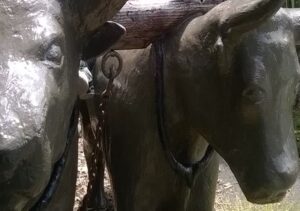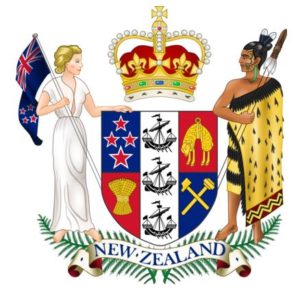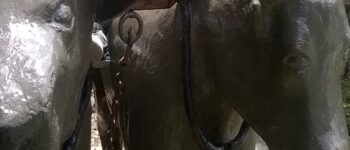1820: God Speed the Plough
May 3, 2023
By AHNZ

Today in New Zealand history, 3 May, 1820, the first plough was taken to New Zealand’s soil. It was pulled by a team of 6 bullocks and driven by John Butler of the Church Missionary Society. Considering how much life has come to New Zealanders thanks to this invention and thanks to its introduction the least we can do is oblige Butler by marking down his contribution.
After all, he wanted it that way..
MAY 3rd.–The agricultural plough was for the first time put into the land of New Zealand at Kideekidee, and I felt much pleasure in holding it after a team of six bullocks brought down by the “Dromedary.” I trust that this day will be remembered with gratitude, and its anniversary kept by ages yet unborn. Each heart rejoiced in this auspicious day, and said, “May God speed the plough.”
 Butler, at Kerikeri, was busting through fern-root and replacing it with wheat. Apart from being a literal act it’s also highly symbolic since Maoris subsisted on fern roots as a poor food item but would take a giant leap forward by accepting wheat-based food. It’s also a reminder that New Zealand was not the clear and cultivated land we know today; Butler was turning busy and gnarly wilderness into the place we live in today.
Butler, at Kerikeri, was busting through fern-root and replacing it with wheat. Apart from being a literal act it’s also highly symbolic since Maoris subsisted on fern roots as a poor food item but would take a giant leap forward by accepting wheat-based food. It’s also a reminder that New Zealand was not the clear and cultivated land we know today; Butler was turning busy and gnarly wilderness into the place we live in today.
Within 2 years Butler had learned [sic] the natives in ploughing too. He wrote in May 1822, “I have learned one native to drive a pair of bullocks, and another to hold the plough, and to harrow in grain, and to trench, etc., etc. I have several others who will become complete farmers in a little time.”
Cultivating soil leads to more than just wheat. That was only the first thing planted but it’s also one of the great New Zealand crops.
“Early settlers found the soil fertile, though dotted with tussocks and spear grass. Paddocks were marked off by sod walls with a top sprinkling of gorse seed which quickly provided a hedge on the sod base. Wheat was successfully grown and some years a veritable sea of wheat waved on each side of the Island Road from the Ohoka Road to the cross road in Clarkville.” – Brockelbank (1954)”
“Morgan, more than most CMS missionaries, strove to give his Maori converts ‘the comforts of small English farmers’. Morgan envisaged ‘Each family with their neat boarded cottage, surrounded by their orchards and wheatfields, the men employed in driving their Carts,…their women…engaged with their sewing,…training their children in the habits of honest industry.’ His vision was expressed as a romantic idyll.” – Dictionary of New Zealand Biography (1990,) Encyclopedia of New Zealand
“”With the reduced supply available in market we haven’t been able to source enough New Zealand grown wheat for our Edmonds flour,” a company spokesperson said. “In order to ensure Kiwis have access to an ongoing supply of high quality flour, we have had to urgently source wheat from Australia,”” – Wheat shortage leads Edmonds to urgently find Australian source, 1 News (2022)
 Wheat dominated the economy of early Canterbury right up to the turn of the century. Wheat went hand-in-hand with steam-powered industrialisation.
Wheat dominated the economy of early Canterbury right up to the turn of the century. Wheat went hand-in-hand with steam-powered industrialisation.
Wheat is so much a part of our heritage, it is an embalm on the New Zealand Coat of Arms.
It was also wheat power that made Maoris prosperous thanks to John Morgan in places like Te Awamutu and helped pay for their expenses in the Waikato War.
Yet in the 2022 New Zealand had to IMPORT wheat from Australia!
On behalf of our Settlers, with wheat in their veins, I’m appalled that it’s come to this. A Canterbury institution, Edmonds, has to import Australian wheat!? Next thing we’ll be importing coal and wool and trying to ban the word ‘mate’ I suppose?
—
Note: The Silver Plough competition was put together by Federated Farmers in 1956 at the invitation of World Ploughing Organisation, England. They’re still going as of the 2020s and remember the above heritage. Ref. NZ Plough
Ref. The Journals and Correspondence of the Rev. John Butler, Barton (1927); Early New Zealand Books, Auckland University
Image ref. Ranakia Silver Plough final, 1989 sticker. AHNZ Archives (1989)
—
Image ref. Bullock statue in Henderson, Auckland. AHNZ Archives (2015)
2 thoughts on "1820: God Speed the Plough"
Leave a Reply
 Like Comment Share
Like Comment Share






Our Govt has lost its way, perhaps deliberately, John Butler would be scratching his head in bewilderment at us now swimming in sugar and deficient in wheat, relying on dodgy imported meats and fruit.
My generation was raised to respect authority but in return we expected that authority to keep the basics in life at the front of every decision and before party dogma.
Abour 30% of voters are swing voters, are these people in fact dissatified with core govt, swinging from Labour to National in search of integrity.
I don’t know him well but I think he knew a thing or two about bad bosses.